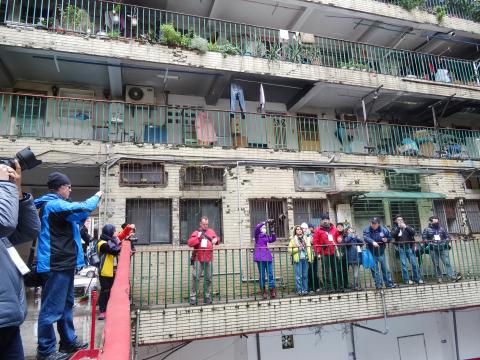The last time TC Lin (林道明) tried to organize a photography walk around Zhongzheng District’s (中正) dilapidated Nanjichang (南機場) neighborhood, it snowed in Taipei.
A street and documentary photography instructor at Zhongzheng Community College, Lin is hoping for better weather tomorrow as he attempts to gather photographers — amateurs and professionals alike — to capture everyday life in this 52-year-old community of about 2,000 households before it disappears to the city’s urban renewal plan.
Once a “model community,” the neighborhood has deteriorated over the years and is now largely occupied by elderly living alone or low-income families. The renewal project has been in talks for many years, but progress has stalled due to a number of problems including resident eligibility and the debate on whether to keep the community’s elementary school.

Photo courtesy of TC Lin
“I talked to the borough warden and he wants to leave a recording of the people, objects and life in the community,” Lin says. “He invited photography students before, but they only took pretty pictures such as flowers and sunsets.”
That’s where Lin’s expertise comes in. He named the event “international photo walk” because he wants to encourage foreign photographers to join in.
“I think it would be interesting to include their point of view in this documentation of the community,” he says. “Their angle and style are often different from Taiwanese.”
The borough warden will give a presentation on the community and take the photographers on a tour — including places that are not usually accessible to the public. Lin says he will provide translation and answer questions for those who don’t understand Chinese, though he hopes that there are more bilingual people on the scene to assist him.
Participants don’t need to be too self-conscious about intruding, as the borough warden has notified residents of the photography tour.
However, Lin says the number one key to documentary photography is respecting the subjects.
“You want to record the people and place because you like them and you respect them,” he says. “What mentality you use to photograph your subject is important because he or she will feel it too.”
Lin hopes to turn the results into an exhibition, set tentatively for late March or early April. He also wants to host a forum with exchanges between local and foreign photographers.

Dissident artist Ai Weiwei’s (艾未未) famous return to the People’s Republic of China (PRC) has been overshadowed by the astonishing news of the latest arrests of senior military figures for “corruption,” but it is an interesting piece of news in its own right, though more for what Ai does not understand than for what he does. Ai simply lacks the reflective understanding that the loneliness and isolation he imagines are “European” are simply the joys of life as an expat. That goes both ways: “I love Taiwan!” say many still wet-behind-the-ears expats here, not realizing what they love is being an

Google unveiled an artificial intelligence tool Wednesday that its scientists said would help unravel the mysteries of the human genome — and could one day lead to new treatments for diseases. The deep learning model AlphaGenome was hailed by outside researchers as a “breakthrough” that would let scientists study and even simulate the roots of difficult-to-treat genetic diseases. While the first complete map of the human genome in 2003 “gave us the book of life, reading it remained a challenge,” Pushmeet Kohli, vice president of research at Google DeepMind, told journalists. “We have the text,” he said, which is a sequence of

Every now and then, even hardcore hikers like to sleep in, leave the heavy gear at home and just enjoy a relaxed half-day stroll in the mountains: no cold, no steep uphills, no pressure to walk a certain distance in a day. In the winter, the mild climate and lower elevations of the forests in Taiwan’s far south offer a number of easy escapes like this. A prime example is the river above Mudan Reservoir (牡丹水庫): with shallow water, gentle current, abundant wildlife and a complete lack of tourists, this walk is accessible to nearly everyone but still feels quite remote.

It’s a bold filmmaking choice to have a countdown clock on the screen for most of your movie. In the best-case scenario for a movie like Mercy, in which a Los Angeles detective has to prove his innocence to an artificial intelligence judge within said time limit, it heightens the tension. Who hasn’t gotten sweaty palms in, say, a Mission: Impossible movie when the bomb is ticking down and Tom Cruise still hasn’t cleared the building? Why not just extend it for the duration? Perhaps in a better movie it might have worked. Sadly in Mercy, it’s an ever-present reminder of just